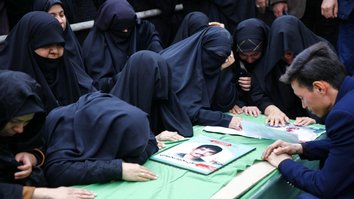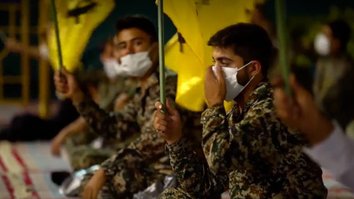KABUL -- Tehran plans to use Fatemiyoun Division fighters returning to Afghanistan from Syria to stir up violence and undermine a historic peace deal between the United States and the Taliban, analysts and government officials say.
The fighters, originally sent to fight for Syrian President Bashar al-Assad's regime, were recruited by Iran's Islamic Revolutionary Guard Corps (IRGC) from communities of Afghan refugees and migrants living inside Iran.
Now that a peace accord between the United States and the Taliban was signed Saturday (February 29), Tehran could use Fatemiyoun members to destabilise the country.
"We all witnessed when Iran provided financial and military support to a faction of the war during the 1990s, and Afghans are still concerned that Iran may create chaos once the international security forces leave Afghanistan," said Yousuf Amin Zazai, a military affairs analyst in Kabul.
![Members and supporters of the Fatemiyoun Division gather in Mashhad, Iran, to celebrate the 41st anniversary of the Islamic Republic. Maj. Gen. Qasem Soleimani, pictured in the poster behind the stage, was the architect behind the formation of the Afghan militia. [File]](/cnmi_st/images/2020/03/02/22773-soleimani-585_329.jpg)
Members and supporters of the Fatemiyoun Division gather in Mashhad, Iran, to celebrate the 41st anniversary of the Islamic Republic. Maj. Gen. Qasem Soleimani, pictured in the poster behind the stage, was the architect behind the formation of the Afghan militia. [File]
![In this photo taken February 20, people gather in Mashhad, Iran, to bury two members of the Fatemiyoun Division who were killed in Syria. [File]](/cnmi_st/images/2020/03/02/22771-fatemiyoun_2-585_329.jpg)
In this photo taken February 20, people gather in Mashhad, Iran, to bury two members of the Fatemiyoun Division who were killed in Syria. [File]
"They [Tehran] could mobilise and support the Fatemiyoun Division to increase their influence on Afghanistan and achieve their security goals," he said.
"As Fatemiyoun Division fighters fought for money and Iran's interests in Syria, there are concerns that the group will one day fight in Afghanistan to achieve Iran's interests as well as for money, power and religious matters," said Zazai.
A day before the peace deal's signing, US Secretary of State Mike Pompeo warned Tehran not to scuttle the agreement with the Taliban.
"There is a history of Iran engaging in activity inside of Afghanistan to act as a spoiler," Pompeo said.
From the sidelines, Tehran is already jeering at the hard-won agreement.
"The United States has no legal right to sign a peace agreement or to decide the future of Afghanistan," the Iranian Foreign Ministry said in a statement Sunday (March 1).
Proxy war
Analysts and government officials seconded Pompeo's concerns, saying Tehran aims to use the Fatemiyoun Division for a proxy war in Afghanistan.
"By order of Iranian generals, Fatemiyoun Division fighters, as Iran's proxy soldiers, have committed violence ... for years in Syria and they will carry out similar acts in the future in Afghanistan as well," said Aminullah Shariq, a political affairs analyst.
"Returning Fatemiyoun Division fighters are considered a serious risk for the stability and security of Afghanistan, and Tehran will use them to fight its proxy war against Afghanistan as well against the American and NATO forces," he added.
"Iran has created the Fatemiyoun Division for its proxy war and for its long-term goals in the region, and there is a good possibility that it will use these fighters in the future," he said.
"They have experienced fighting and violence in Syria for years, and they are now accustomed to it," he added. "Their return to Afghanistan will add to the violence and instability in the country."
The return of the Fatemiyoun members to Afghanistan could spur sectarian and tribal violence, said Ibrahim Rahimi, the director of the Commission of the National Cohesion of Political Parties, Social Organisations and Civil Society Institutions in Kabul.
"The return of the Fatemiyoun fighters could be like [the outbreak of] the new coronavirus and can incite the entire country to war and violence," he said.
"The return of the Fatemiyoun fighters poses a serious risk to the national interests of Afghanistan as it will push the country toward new religious and tribal conflicts," said Rahimi.
Sayed Sardar Hussaini, a 33-year-old shopkeeper in Kabul city, shares that sentiment.
"We haven't seen a religious or tribal war in our country, but if the Fatemiyoun fighters return from Syria to Afghanistan, a religious war will unfortunately begin in our country," he said.
Threat to peace
Ghulam Wali Afghan, a representative from Helmand Province in the Wolesi Jirga, called the return of the outfit to Afghanistan a potential major threat to peace.
"Iran, directly and indirectly, provides military support to paramilitary groups, and the Fatemiyoun Division is one of those groups," he said.
"Iran uses the Fatemiyoun Division to achieve its future political and military goals in Afghanistan, and the return of the paramilitary group is a potential threat to the national security of Afghanistan," he added.
"Before Fatemiyoun fighters fully settle in Afghanistan and reorganise themselves, the government needs to put in place measures to prevent the group's activities," Afghan said.

![Members of the Fatemiyoun Division gather in Mashhad, Iran, last October to commemorate the martyrdom of Imam Reza. [File]](/cnmi_st/images/2020/03/02/22772-fatemiyoun-585_329.jpg)







Salaam, those who have imparted their own view in this magazine, are themselves the cause of religious discords in Afghanistan, and they provoke sowing discords and weaken Shias in Afghanistan through the nationalist government. They take direct orders from Wahhabi Saudi and America and Israel. Remember that Wahhabism of today is not only against Shia, but also against Hanafi sect. They covered hundreds of seminaries (religious schools) in Afghanistan to direct the youth toward Wahhabism.
Reply3 Comment
There is no doubt that Iran has used Afghan refugees as political pressure pyramid, but Tehran does not have that much power to deploy Fatemiyoun militants in Afghanistan. Second, among the Fatemiyoun group, there are also some of Afghans who will never be ready to come to Afghanistan for igniting the fire of discord to start fighting. Third, those who were named as experts in this report are the ones who are accused of igniting sectarian and religious fire. Some do not exist at all, and all of them are fake names; therefore, it is better as officials of Salaam Times pay attention in this ground in order that the site not lose its credibility.
Reply3 Comment
Your report is no more than a bullshit. So far I have not heard from any media to say that Fatemiyoun is a threat for Afghanistan. It is true that some Hazaras are sent to fight in Syria. There is religious war in Syria and the war of these Fatemiyoun is with ISIS which is the enemy of Shia, but in Afghanistan, Taliban don’t target Hazaras. Hazaras will become happy if Taliban reach to power, because Taliban will annihilate ISIS, and Hazaras will not be the victims of ISIS attacks in Afghanistan. Iran also knows that Taliban are good for them, and it has provided assistance to the Taliban for many years in the past. Iran knows that if Taliban are in power, they will destroy ISIS within one month in Afghanistan; therefore, I request you to release true reports which are not lies and should stand on truth.
Reply3 Comment